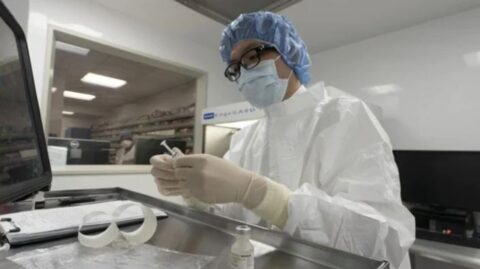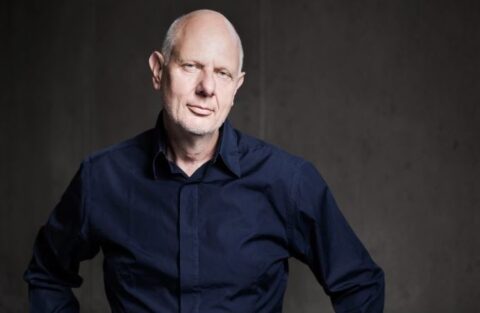After lawmakers in Hong Kong announced a new bill that would allow fugitives to be extradited to mainland China in early June 2019, the streets of the large, modern city have been mobbed by huge numbers of protesters.
On Sunday, June 9, more than 1 million protestors stopped traffic and blocked roads leading to the Legislative Council building complex where a lawmaker debate over the controversial bill had been slated.
To prevent authorities from identifying them, many protesters cover their faces. But more high-tech citizens direct high-powered laser beams at surveillance cameras connected to a centralized face recognition database of images collected from official offices, applications for housing, loans or credit, and the like.
A video published on Twitter showed what looks like a rock concert laser-light show – but multiple vivid blue and lime-green rays of concentrated light were definitely lighting up and trying to blind the police, armed in full riot gear and standing at the ready, who faced the throng from the safety of a building rooftop.
For the past three months, protesters have been annoying and distracting staff members inside the police headquarters by shining brilliant lasers capable of burning through flesh or putting an eye out.
Former electrical engineering associate professor at the University of Hong Kong Dr. William Cheung Sing-wai confirmed that:
“Laser pointers, especially those with high power, can burn one’s skin and cause permanent injury to the eyes.”
On a positive note, laser pointer sales are up in the Aplui Street market of Hong Kong. The larger laser pointers sell out first but the smaller “stargazing pens” are also popular tools for both offense and defense.
We say tools, the police in Hong Kong say weapon as they refer to all laser pointers as “laser guns.” Three police officers injured by lasers required medical treatment.
According to Dr. Sing-wai, laser points that teachers use can project less than 1 milliwatt of power which is enough to damage an eye. At a police demonstration, a laser beam at close range set a sheet of paper on fire.
Passers-by have also been targeted with lasers to stop them from snapping images that authorities could use to identify the upstarts.
Steve Li Kwai-wah, the Senior Superintendent of the Organized Crime and Triad Bureau, stated that laser weapons are not prohibited in Hong Kong.
That being said, there is trouble brewing over the confiscated lasers because “the laser pointers seized by police breached the Trade Descriptions Ordinance for failing to display energy levels or warning labels.” Customs officials now control the case.
This number of protestors hasn’t been seen since mainland China regained control of Hong Kong from the colonial British in 1997.
Citizens of Hong Kong caught protesting are being blacklisted by their government which is forcing companies to ban such employees from the workplace. This is cascading into the economy as businesses are suffering from transportation shutdowns caused by the determined protesters.
Hong Kong opponents of the extradition law believe that it would threaten the legal relationship they have had with China since the early 1980s. Deng Xiaoping, the Paramount Leader of the People’s Republic of China, is responsible for the current “one country, two systems” rules of governance.
Unified China agreed to preserve the separate economic and administrative systems in certain Chinese regions, including Hong Kong. The Hong Kong government operates on its own and handles all legal, economic, financial business, and foreign trade relations.
Allowing Hong Kong to extradite Hong Kong residents suspected of criminal activity (which includes protesting the extradition bill) would give Communist China a toe-hold into dictating policy in neighboring Hong Kong.
China is infamously building the ultimate Big Brother-esque surveillance state and is using their advanced public biometric identification system to shame jaywalkers which is a big deal in that ancient culture of honor and dishonor.
Meanwhile, the ongoing mass protests in Hong Kong continue to interrupt business-as-usual. They say they won’t disperse until their demands are met:
- Withdraw the extradition bill formally and completely.
- Start a formal investigation into police brutality.
- Force the resignation of Carrie Lam, Hong Kong’s Chief Executive.
- Release protesters who have been arrested.
- Adopt other specific democratic reforms.
Slogans left by protesters on some government buildings in the city center said, “Down with the Chinese Communist Party,” and “F–k Zhina” (Zhina was the derogatory term for China used by the Japanese during its partial occupation of Hong Kong in the 1930s and 1940s.
Hong Kong lawmakers were quick to respond, posting an official statement on the office’s website which claimed the slogans “insulted the country and its people” and said the demonstrators had gone “well beyond the scope of peaceful protest.”
Hong Kong was relatively quiet in July but violent demonstrations have been increasing since early August. The eyes of the world are on the people of Hong Kong with the hope, difficult as it may seem, for a peaceful resolution.




